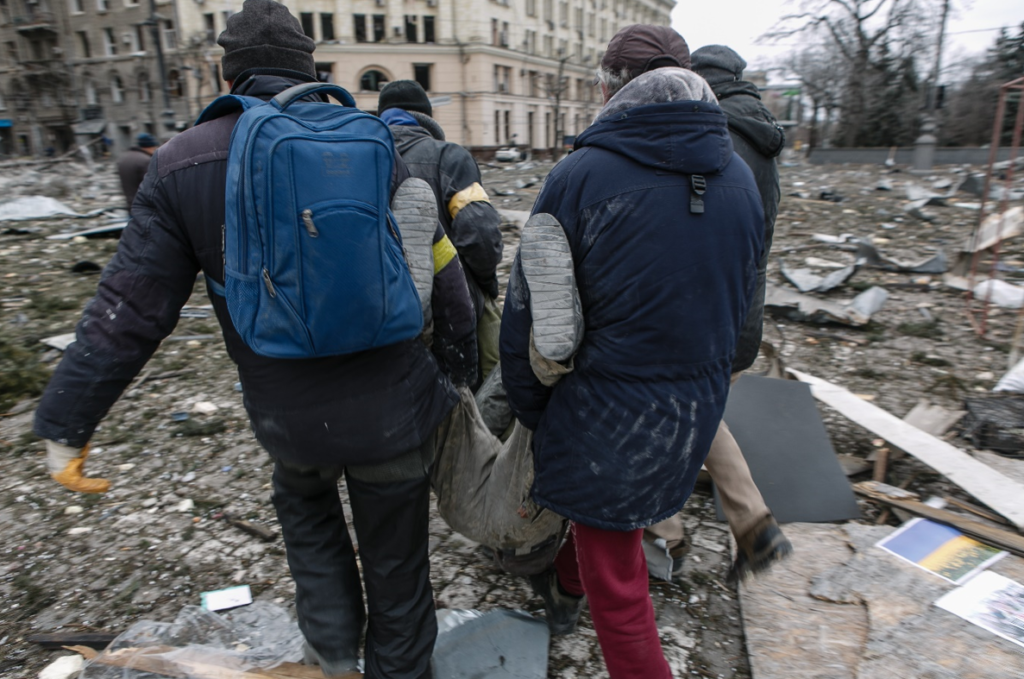The cruelty of the situation in Ukraine has emanated throughout the world. Carrying with it, profound stories of courage and determination witnessed by the rest of the world. In response to the horrors, 2 million Ukrainians have fled their home-country at the time of writing this. Train stations have been overrun with massive crowds where many mothers and children have had to say goodbye to male family members staying behind to fight. Cities have been battered by uninterrupted Russian bombing and civilian casualties are rising.
And, through the conflict, Healthcare professionals have continued to risk their lives in order to save the lives of others. Delivering babies, treating, and saving civilians whilst carrying out important surgeries. It never stops : even in the most appalling of circumstances. The truth is that the circumstances are getting worse. According to reports from the World Health Organisation (WHO) hospitals in Ukraine have come under attack by Russian military.
Additionally, many doctors have been living and working in these hospitals without breaks. Recently, an ITV reporter spoke to Dr Volodymyr Suskyi, a surgeon, currently stationed in a hospital in Kyiv. He explains that normal clinical activity has been halted in order to deal with many cases of combat trauma and priority is given to those who need urgent surgery. He also explained that the hospital is extremely worried about running out of trauma equipment and essential medicines as deliveries are being prevented by Russian military. Furthermore, The WHO has explained that hospitals are running out of medicinal oxygen which is crucial for many illnesses including neonatal complications and COVID-19.
Then, Dr Suskyi describes the reality of war further. He says that when alarms sound in the city, they must decide to who take down to bomb shelter as there isn’t enough space for every patient. And, there are risks to moving patients – especially those who are currently in Intensive care. This harrowing story is one of many increasing worries of those who are looking after Ukraine. Some reports have foretold that many professionals feel that one of their main challenges is a lack of knowledge and training of how to deal with mass casualties in conflict.
The stress of conflict permeates onto vital infrastructure and has closed pharmacies and general practices. This means that many essential medicines such as antibiotics, insulin and psychiatric drugs are not being distributed to those who need them. Many worries are also expressed for those with cancer as many patients have had to stop their chemotherapy and are unable to leave due to being too frail.

The United Nations (UN) has made an appeal for emergency aid of medical supplies. Many countries have given money and pharmaceutical companies such as Roche and Pfizer. They have donated medicine through their partnership with International Health Partners (IHIP) into surrounding countries Moldova and Poland. The British government have pledged to donate over 40 million pounds and pallets of medical aid. One example in the UK in response to the crisis has been efforts by the NHS to gather kit, drugs, and equipment for Ukraine. The initiative, organised by Medical Aid Ukraine, a new organisation formed by doctors across the UK has been collecting donations from GP surgeries, drug companies and hospitals. Many trucks and ambulances will also be sent to the Poland/Ukraine border for supplies to be delivered. Spearheaded by Lviv born pain management consultant, Dr Roman Cregg. He is also coordinating the convoy and has planned to join other French and German doctors who are stationed in make-shift refugee camps in Poland.
One of the worries for many aid organisations though, is that there is no safe passage into Ukraine in order to provide direct relief. Soul-wrenching reports of Ukrainian civilians being attacked by Russian forces as they try to flee have made many organisations such as Médecins Sans Frontiers (MSF) call for the promise that the rules of war should be observed, and civilians should be allowed to leave. As well this, they demand that humanitarian aid should be able to be safely delivered in war-afflicted areas. Without essential supplies, doctors like Dr Volodymyr Suskyi will become increasingly hampered in their efforts to save lives.
Another tragic biproduct of conflict is that disease spreads more violently and quicker. The world has been quick to forget the COVID-19 pandemic, which for much of world is still in crisis. Only 35% of Ukrainians have been fully vaccinated and with an oxygen shortage looming, many seriously ill patients cannot survive without essential supplies. In many parts of the world, communicable diseases thrive in areas of poor sanitation and lack of healthcare infrastructure. And, everyday that passes the reality is looking bleaker. Ukraine’s efforts to curb the spread of polio, measles, and other infectious diseases are not hopeful in the crowded conditions of bomb shelters combined with crammed trains, buses and cars of people fleeing that make for the perfect conditions for illness to thrive.
Healthcare professionals in Ukraine will continue to fight the shortages of care and carry on doing the best in such dire situations. Many are following the oaths that they are proud of to protect human life at all costs. Many did not realise that this would entail War. And for many, the effects will be felt for years after. The feeling amongst most of those in this community is the need to emphasise a need to remember efforts in Ukraine and around the world. Similar struggles have been unfolding in Palestine, Yemen, Kashmir, and other regions. Whilst there may be different and distinct dynamics to each conflict, the coverage from media outlets and external efforts have been radically different. Human life is priceless no matter who you are.
Information to find out how you can support efforts in Ukraine can be accessed using this link : https://www.gov.uk/government/news/ukraine-what-you-can-do-to-help

